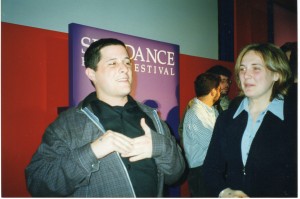Previously: Blockbuster Trends
Many video-on-demand outlets require Closed Captions. This is true in the USA and increasingly elsewhere in the world, for example in the UK and Australia. And while it is not yet a mandatory requirement for all films submitted to Kinonation, we very strongly recommend it, not least because without captions a film won’t be eligible for delivery to iTunes. This has generated many questions from filmmakers, which I’ll try to answer here.
Why Captions Drive Revenue
Only 3 in 1000 people in the US are “functionally deaf.” But 17% of Americans report some sort of hearing impairment, which amounts to over 50 million people. That percentage is more or less reflected worldwide. Closed captions allow those people to enjoy your movie. Big potential audience. BUT – it’s not just about physiological hearing issues. Your audience will often watch films on a laptop in a noisy cafe, or a tablet on a commuter train, or a TV in a bar — or simply at home in the kitchen with the sound of cooking and kids. Closed Captions allow consumers in all these scenarios to watch your film comfortably…and therefore generate revenue for you.




